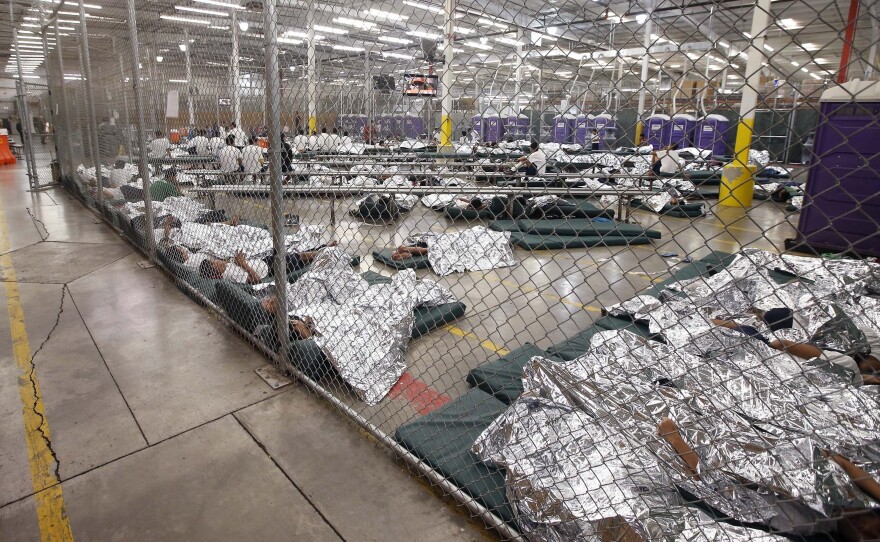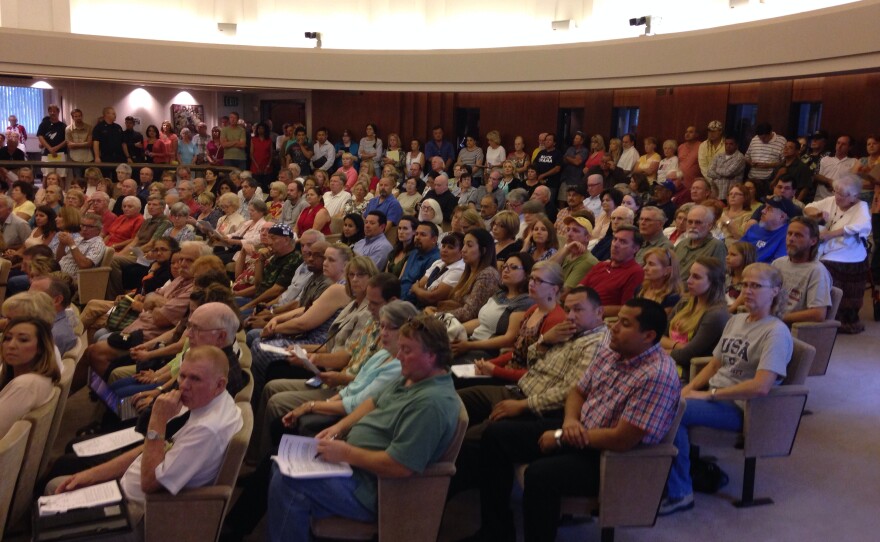The city of Escondido has changed a section of its zoning code that could further complicate attempts to open a shelter there for migrant children caught crossing the border illegally.
The change came two weeks after the city’s planning commission upheld its decision to deny a request from the non-profit Southwest Key to open a migrant children’s shelter in a residential neighborhood.
Around the time of the denial, Southwest Key told the city that it had secured leases with two defunct hotels to open shelters within the city’s commercial zone.
If classified as a “residential care facility” — which Southwest Key alleges is the proper classification for a facility offering temporary care to migrant children — it could have opened in Escondido’s commercial district without a public hearing. But the City Council voted to amend the zoning code in late July, requiring a public hearing for proposed residential care facilities in commercial areas as well as residential areas.
“The timing is suspicious, to say the least,” David Loy, legal director of the ACLU of San Diego and Imperial counties, said. Loy is representing Southwest Key in a legal battle against Escondido over the shelter.
The city, for its part, asserts that the zoning code change was part of a comprehensive review to make sure the code was consistent with its general plan. The City Council approved the change on a vote of 5-0 during its Aug. 6 meeting.
Barbara Redlitz, Escondido’s community development director, said the city wants more oversight of residential care facilities in commercial zones to ensure they don’t dilute the tax base.
“We were looking at it from that standpoint,” Redlitz said.
She also said that requiring residential care facilities to get a conditional-use permit, which comes along with a public hearing, would “allow the city to look a little closer at the operating procedures of those facilities.”
Loy said his client, Southwest Key, is still considering how to respond to the change. In the meantime, it is also appealing the planning commission’s decision to deny its permit to operate a shelter in a residential neighborhood.
That shelter would have occupied a former nursing home, with a capacity to house 96 children aged 6 to 17. At a public hearing on June 24, more than 100 people spoke about the proposed shelter — the vast majority in opposition.
Many railed against what they viewed as the federal government’s lax immigration policies, saying that housing migrant children who snuck across the border would send the wrong message.
U.S. border authorities have apprehended close to 63,000 children at the southwest border since October 2013, a 100 percent increase compared to last year. Once apprehended, federal law requires the children be turned over to the federal Department of Health and Human Services, which contracts with organizations like Southwest Key to provide temporary care for the children until they can be reunited with family members or sponsors.

After listening to hours of testimony at the June hearing, the planning commission voted 7-0 to deny a permit to Southwest Key. In its official resolution, the commission said the proposed site was too small to accommodate 96 children along with staff, and that it lacked outdoor recreation. It also found that Southwest Key’s plan to take children in their custody to parks and schools for recreation would have a negative impact on Escondido residents’ use of those facilities.
The commission also said there wasn’t enough onsite parking and the proposed plan to fence the facility off to keep children in was “inadequate for the anticipated security needs.”
The planning commission's decision didn’t seem to take account of reports from city staff. According to a report from planning commission staff, Escondido’s police department expressed no concern regarding the proposed shelter and supported the plan to fence it off. The staff report also found that parking was adequate.
Loy from the ACLU has appealed the decision to Escondido’s City Council. He said the planning commission’s stated grounds for denying the permit weren’t substantiated by facts.
“The proposed facility would be virtually indistinguishable from that of the nursing home which operated on the same site for more than 30 years,” Loy said upon announcing the appeal.
Interviews and an examination of documents and correspondence between city officials and representatives of Southwest Key show that the city sought to force the shelter issue into the public spotlight.
Southwest Key first approached the city in February about opening a shelter for migrant youth in one of several defunct hotels. The organization sought to be classified as a “residential care facility,” which is how its operations are licensed under California’s Community Care Facilities Act.
Southwest Key operates seven children’s residential group homes in California, including two in San Diego County that house migrant children — in El Cajon and Lemon Grove. The 10-bed shelter in Lemon Grove has operated as a “large residential care facility” since the early 1980s.
A Southwest Key shelter for migrant youth in Youngtown, Arizona — with 130 beds — is also classified as a residential care facility.
Nevertheless, Escondido has disagreed with the classification, arguing at various times that the organization’s operations were more like an orphanage, a shelter, a rooming and boarding house, multifamily transitional housing or a hybrid of several. In the end, the city determined that the proposed facility was a shelter, and therefore could only open in the city’s emergency shelter overlay zone.
Southwest Key appealed the decision on April 21, but then put the appeal on hold after it agreed with the city to pursue a conditional-use permit to operate in the former nursing home under the classification “government services” provider.
Loy said the city has not put forth any valid reasons for keeping Southwest Key out.
“I think they clearly are entitled to operate this facility in Escondido on either or both of the sites under any reasonable classification," Loy said, referring to the nursing home site or one of the proposed hotel sites.
The city has denied it’s trying to keep Southwest Key from opening a shelter. But assistant city planning director Jay Petrek said in a telephone interview last month that Escondido officials wanted the issue to be aired publicly.
“This facility was so unique…we didn’t really want it to go anywhere in the city without a public hearing,” Petrek said.
“This use really is more of a policy call than it is a land-use issue from a planning perspective,” he said, adding that planning staff felt Southwest Key’s proposal to open a shelter in the former nursing home “met the test” for acquiring a conditional-use permit to operate “but we were wary to recommend either way because the use was so unique.”
The City Council will hold a second reading of its land-use change at its Aug. 13 meeting. If its decision is upheld the change will go into effect in 30 days. The council likely will hear Southwest Key’s appeal of the planning commission’s denial for the former nursing home permit in September.







